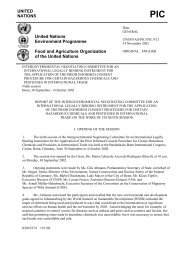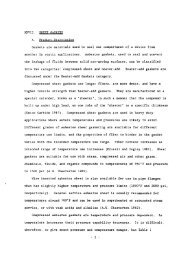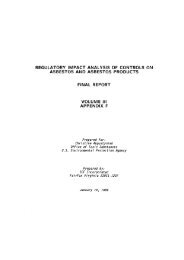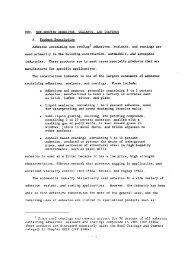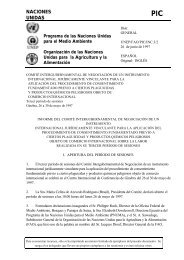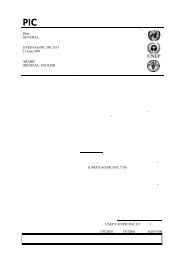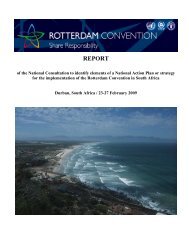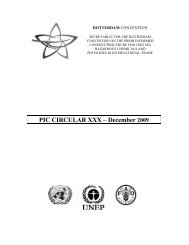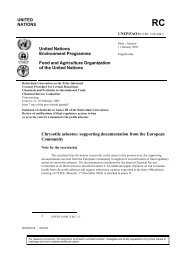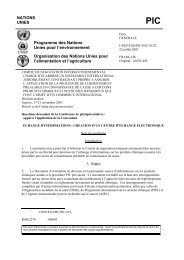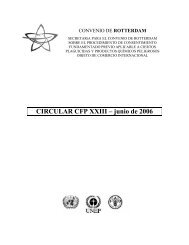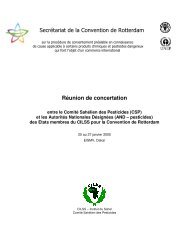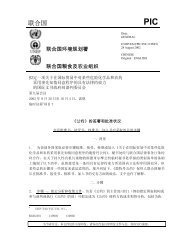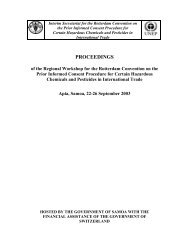Rep o rt of th e tw en - Rotterdam Convention
Rep o rt of th e tw en - Rotterdam Convention
Rep o rt of th e tw en - Rotterdam Convention
You also want an ePaper? Increase the reach of your titles
YUMPU automatically turns print PDFs into web optimized ePapers that Google loves.
Large international cooperation programmes were implem<strong>en</strong>ted on rice, cotton and vegetable<br />
IPM. So far, more <strong>th</strong>an 20 TOTs and 30 000 FFSs in rice have be<strong>en</strong> carried out, and a total <strong>of</strong> more<br />
<strong>th</strong>an 600 facilitators and 100 000 farmers were trained in rice in Sichuan, Hubei, Hunan, H<strong>en</strong>an,<br />
Anhui, Zhejiang, Guangdong Provinces. Eight ToFs and 1 061 FFSs in cotton were held in Shandong,<br />
Anhui, Hubei, Sichuan and H<strong>en</strong>an Provinces in 2000 and 2004, also 245 governm<strong>en</strong>t, 197 farmer<br />
facilitators and over 30 000 cotton farmers were trained. In addition, <strong>th</strong>ere were four more projects<br />
related to IPM: evaluation <strong>of</strong> Bt cotton suppo<strong>rt</strong>ed by China, UK and CAB International, <strong>th</strong>e cotton<br />
bollworm control in small scale farming system by EC and ICAC, monitoring migratory rice pest<br />
by Sino-Sou<strong>th</strong> Korea, and control <strong>of</strong> migratory locusts by Sino-Kazakhstan.<br />
3.5 The Democratic People’s <strong>Rep</strong>ublic <strong>of</strong> Korea<br />
The state policy requirem<strong>en</strong>ts <strong>of</strong> <strong>th</strong>e plant protection organization <strong>of</strong> DPR Korea has be<strong>en</strong> to<br />
establish regular systems, rules and order in boundary inspection, quarantine, to overcome<br />
depa<strong>rt</strong>m<strong>en</strong>talism, to <strong>en</strong>sure unity in activities <strong>of</strong> <strong>th</strong>e interrelated bodies and to streamline <strong>th</strong>e frontier<br />
regulations to <strong>en</strong>able rapid clearance at border points.<br />
There have be<strong>en</strong> some advantages from <strong>th</strong>e merging <strong>of</strong> boundary inspection. Considerable<br />
material, financial and personnel reserves have be<strong>en</strong> obtained <strong>th</strong>rough managem<strong>en</strong>t <strong>of</strong> <strong>th</strong>e newly<br />
merged service. In addition, <strong>th</strong>ere is coordination <strong>of</strong> plans and activities secured to overcome and<br />
correct abnormalities by depa<strong>rt</strong>m<strong>en</strong>talism and irresponsibility.<br />
One <strong>of</strong> <strong>th</strong>e problems <strong>en</strong>countered has be<strong>en</strong> <strong>th</strong>e difficulties in sustaining administrative and<br />
technical activity as required by international standards and recomm<strong>en</strong>dations. Meanwhile, <strong>th</strong>ere is<br />
also a sho<strong>rt</strong>age <strong>of</strong> expe<strong>rt</strong>ise in maintaining regular systems and rules for command, and control<br />
over <strong>th</strong>e implem<strong>en</strong>tation <strong>of</strong> supplem<strong>en</strong>tary measures.<br />
DPR Korea cultivates selected high-yielding crops every year. The outbreaks <strong>of</strong> major pests<br />
differ in int<strong>en</strong>sity and time.<br />
A series <strong>of</strong> measures to improve and str<strong>en</strong>g<strong>th</strong><strong>en</strong> IPM have be<strong>en</strong> implem<strong>en</strong>ted:<br />
i. Training and technology education have be<strong>en</strong> set up for integrated managem<strong>en</strong>t <strong>of</strong> pests.<br />
ii. Preliminary surveys and early warning systems have be<strong>en</strong> established as a pa<strong>rt</strong> <strong>of</strong> pest<br />
control strategy.<br />
iii. An IPM biological control me<strong>th</strong>od has be<strong>en</strong> applied, but has not be<strong>en</strong> increased.<br />
iv. The introduction <strong>of</strong> “right crop on right soil” and “right crop on right period” has produced<br />
useful yield increases.<br />
There have be<strong>en</strong> no changes in <strong>th</strong>e National Plant Protection Organization or its laws. However,<br />
an additional proposal on <strong>th</strong>e international and regional standards was submitted. Basic data for<br />
drawing a distribution map <strong>of</strong> non-phytosanitary pest free areas will be published in one to <strong>tw</strong>o<br />
years. There were also suggestions to supply information collected for one to <strong>tw</strong>o years copied on<br />
CD to member countries. There was a lack <strong>of</strong> urg<strong>en</strong>cy to increase <strong>th</strong>e phytosanitary capacity, and<br />
lack <strong>of</strong> oppo<strong>rt</strong>unities for training.<br />
The standards pesticide applied in DPR Korea promulgated in regulations on pesticide control<br />
issued as Administration Council Directive No. 78 on 12 May 1992. Over rec<strong>en</strong>t years, <strong>th</strong>ere has<br />
be<strong>en</strong> increased att<strong>en</strong>tion on <strong>th</strong>e production and introduction <strong>of</strong> biological and botanical pesticides.<br />
DPR Korea proposes to adopt detailed procedures and me<strong>th</strong>ods <strong>th</strong>rough <strong>th</strong>e “International<br />
Code <strong>of</strong> Conduct” in supplying and using pesticides, standardize <strong>th</strong>e specifications <strong>of</strong> trade marks<br />
13



